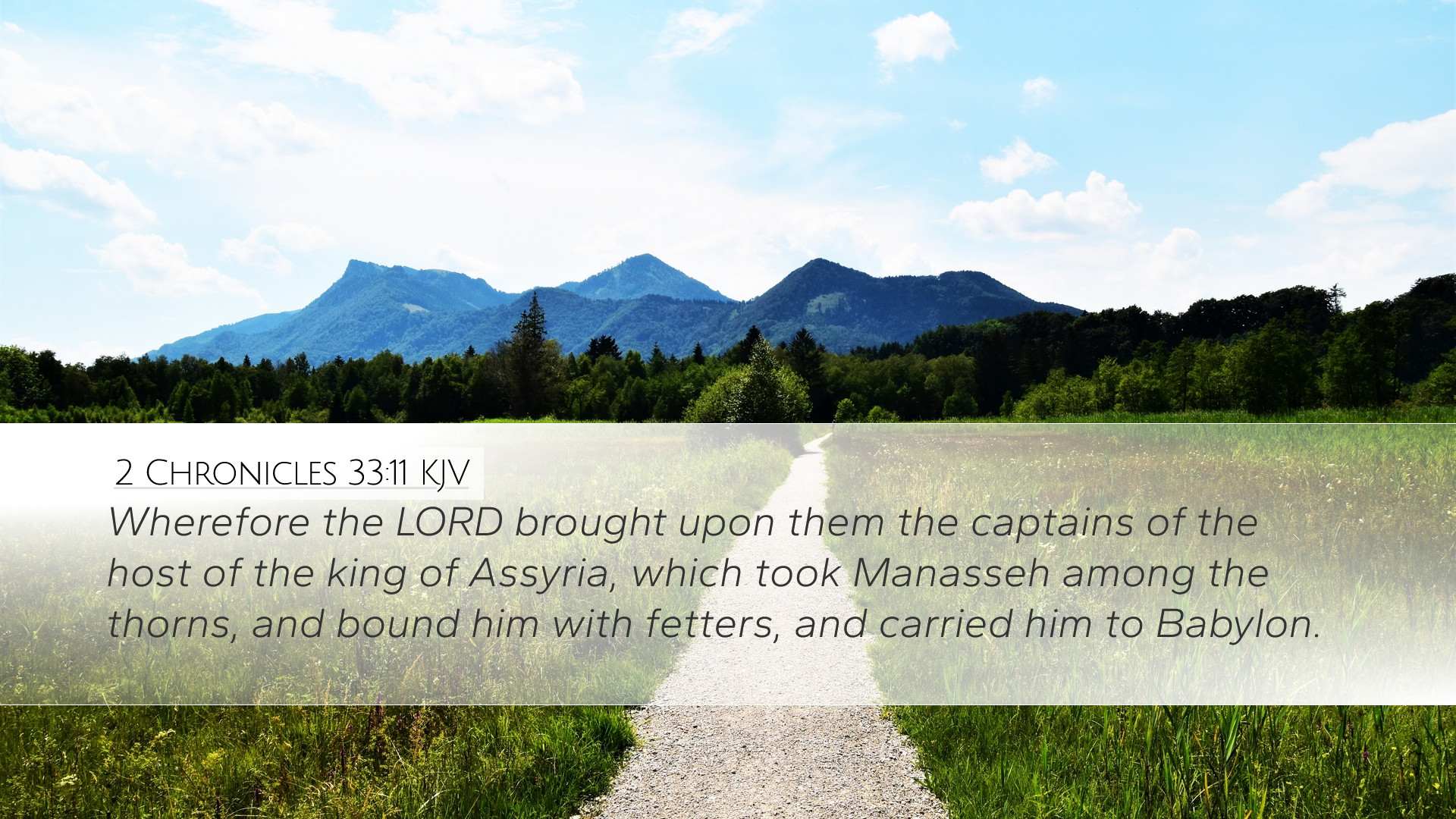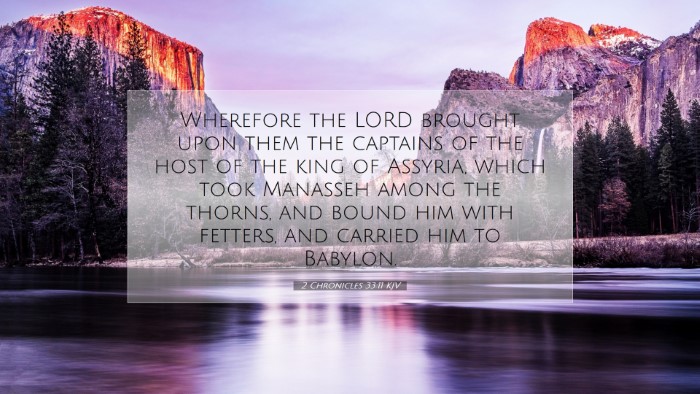Commentary on 2 Chronicles 33:11
Bible Verse: "Therefore the Lord brought upon them the captains of the host of the king of Assyria, which took Manasseh among the thorns, and bound him with fetters, and carried him to Babylon."
Introduction
The passage of 2 Chronicles 33:11 serves as a significant point in the narrative of Manasseh, one of the kings of Judah. This verse encapsulates a critical moment wherein divine retribution is executed against Manasseh due to his idolatry and wicked practices. The historical backdrop involving the Assyrian captivity demonstrates God's use of foreign nations as instruments of judgment, underscoring themes of sin, judgment, and eventual restoration.
The Historical Context
Manasseh's reign is noted for its profound wickedness, characterized by rebellion against Yahweh, idolatry, and the persecution of the faithful. Matthew Henry emphasizes that Manasseh's sins were so egregious that they brought about the 'wrath of the Lord' upon Judah (Henry). Understanding the historical conflict with the Assyrians elucidates how Jerusalem's idolatry drew the attention of this formidable empire, ultimately resulting in severe consequences.
Assyria's Role in Judgment
-
Judgment Mechanism: Adam Clarke notes that the Assyrians, portrayed as "the captains of the host," symbolize God's judgment—a physical manifestation of Israel's spiritual failure.
-
Cultural Significance: The Assyrians were known for their ruthless military strategies and brutal treatment of captives (Barnes). This further illustrates the severity of Manasseh's punishment; his bondage and transportation to Babylon exemplified the depth of his transgressions.
Theological Insights
This verse invites theological reflection on the nature of divine discipline. The captivity of Manasseh, as Clark illustrates, is both a consequence of transgression and an opportunity for restoration, aligning with the biblical narrative of redemption.
1. The Consequence of Sin
The phrase "brought upon them" indicates the active role of God in the unfolding events. This reflects a God who is not indifferent to sin; rather, He is deeply invested in the moral order of His creation. Henry posits that the words serve as a stark reminder of the severity of God's judgment against persistent disobedience. Judah's idolatry and Manasseh's leadership had dire ramifications, signaling a pivotal moment in Israel's history.
2. God's Sovereignty
Despite Manasseh's profound failures, God's sovereignty remains supreme. This event underscores that even wicked kings are subject to divine authority. Barnes highlights that the captivity was a part of God's sovereign plan for Israel's eventual restoration. His ability to use foreign nations to fulfill His purposes reassures believers of His control over history and human affairs.
3. The Possibility of Repentance
The subsequent verses detail Manasseh's ultimate repentance after being taken captive, suggesting that even the most depraved can be redeemed. Clarke emphasizes that Manasseh's encounter with God in his affliction leads to a transformative experience where he turns back to Yahweh. This progression from sin to repentance provides hope and illustrates the depth of God's mercy.
Practical Applications
For pastors, students of theology, and scholars, 2 Chronicles 33:11 offers profound lessons in the areas of judgment, grace, and repentance.
-
Understanding Judgment: This passage encourages examination of personal and communal ways in which sin invites judgment. It serves as a reminder of the serious nature of leading others astray—including congregations and communities.
-
Interceding for the Wayward: Manasseh's eventual return challenges believers to pray for those who are currently entrenched in sin, trusting in God's power to redeem and restore.
-
Embracing Grace: The story of Manasseh urges communities to extend grace to those who repent, fostering a culture of forgiveness and restoration similar to what God exemplifies.
Conclusion
In summation, 2 Chronicles 33:11 stands as a poignant reminder of the interplay between divine judgment and grace. It challenges us to reflect on the consequences of sin while simultaneously holding onto the hope found in repentance. By delving into the rich insights from commentators such as Matthew Henry, Albert Barnes, and Adam Clarke, we uncover a multifaceted understanding that can guide believers as they navigate their discipleship journey.


